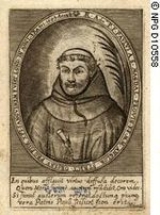
Henry Heath
Encyclopedia
Henry Heath was an English Franciscan and Roman Catholic martyr.
Blessed Henry was born in 1599 and baptized at St. John's, Peterborough, 16 December 1599. His father was John Heath. He attended Corpus Christi College, Cambridge
, receiving a B.A. in 1621, and was made college librarian. In 1622 he was received into the Roman Catholic Church by George Muscott, and, after a short stay at the English College at Douai, entered the Franciscan convent of St. Bonaventure's there in 1625, taking the name of Paul of St. Magdalen.
Early in 1643, he with much trouble obtained leave to go on the English mission and crossed from Dunkirk to Dover disguised as a sailor. A German gentleman paid for his passage and offered him further money for his journey, but, in the spirit of St. Francis, Heath refused it and preferred to walk from Dover to London, begging his way.
On the very night of his arrival, as he was resting on a door step, the master of the house gave him into custody as a shoplifter. Some papers found in his cap betrayed his religion and he was taken to the Compter
Prison. The next day he was brought before the Lord Mayor, and, on confessing he was a priest, was sent to Newgate
. Shortly afterwards he was examined by a Parliamentary committee, and again confessed his priesthood. He was eventually indicted under the 1585 "Act against Jesuits, Seminary priests and other such like disobedient persons" (27 Eliz. c. 2) for being a priest and present in the realm of Queen Elizabeth
. While imprisoned at Tyburn he reconciled in the very cart one of the criminals that were executed with him. He was allowed to hang until he was dead.
Henry Heath was among the eighty-five martyrs of England and Wales
beatified
by Pope John Paul II
on 22 November 1987.
Blessed Henry was born in 1599 and baptized at St. John's, Peterborough, 16 December 1599. His father was John Heath. He attended Corpus Christi College, Cambridge
Corpus Christi College, Cambridge
Corpus Christi College is a constituent college of the University of Cambridge. It is notable as the only college founded by Cambridge townspeople: it was established in 1352 by the Guilds of Corpus Christi and the Blessed Virgin Mary...
, receiving a B.A. in 1621, and was made college librarian. In 1622 he was received into the Roman Catholic Church by George Muscott, and, after a short stay at the English College at Douai, entered the Franciscan convent of St. Bonaventure's there in 1625, taking the name of Paul of St. Magdalen.
Early in 1643, he with much trouble obtained leave to go on the English mission and crossed from Dunkirk to Dover disguised as a sailor. A German gentleman paid for his passage and offered him further money for his journey, but, in the spirit of St. Francis, Heath refused it and preferred to walk from Dover to London, begging his way.
On the very night of his arrival, as he was resting on a door step, the master of the house gave him into custody as a shoplifter. Some papers found in his cap betrayed his religion and he was taken to the Compter
Compter
A compter, sometimes referred to as a counter, was a type of small English prison controlled by a sheriff. The inmates were usually civil prisoners, for example dissenters and debtors...
Prison. The next day he was brought before the Lord Mayor, and, on confessing he was a priest, was sent to Newgate
Newgate
Newgate at the west end of Newgate Street was one of the historic seven gates of London Wall round the City of London and one of the six which date back to Roman times. From it a Roman road led west to Silchester...
. Shortly afterwards he was examined by a Parliamentary committee, and again confessed his priesthood. He was eventually indicted under the 1585 "Act against Jesuits, Seminary priests and other such like disobedient persons" (27 Eliz. c. 2) for being a priest and present in the realm of Queen Elizabeth
Elizabeth I of England
Elizabeth I was queen regnant of England and Ireland from 17 November 1558 until her death. Sometimes called The Virgin Queen, Gloriana, or Good Queen Bess, Elizabeth was the fifth and last monarch of the Tudor dynasty...
. While imprisoned at Tyburn he reconciled in the very cart one of the criminals that were executed with him. He was allowed to hang until he was dead.
Henry Heath was among the eighty-five martyrs of England and Wales
Eighty-five martyrs of England and Wales
The Eighty-five Martyrs of England and Wales are a group of men who were executed on charges of treason and related offences in the Kingdom of England between 1584 and 1679...
beatified
Beatification
Beatification is a recognition accorded by the Catholic Church of a dead person's entrance into Heaven and capacity to intercede on behalf of individuals who pray in his or her name . Beatification is the third of the four steps in the canonization process...
by Pope John Paul II
Pope John Paul II
Blessed Pope John Paul II , born Karol Józef Wojtyła , reigned as Pope of the Catholic Church and Sovereign of Vatican City from 16 October 1978 until his death on 2 April 2005, at of age. His was the second-longest documented pontificate, which lasted ; only Pope Pius IX ...
on 22 November 1987.

